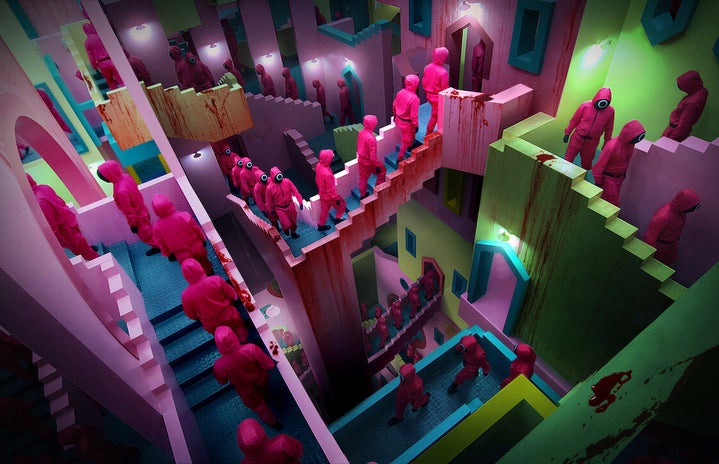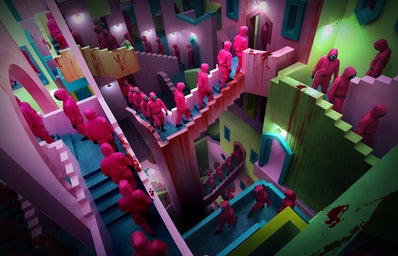(Warning: Spoilers ahead!)
With the hashtag #squidgame having over 11 billion views earlier last week on TikTok and jokes about how people would pose during “Red Light, Green Light,” it’s no question that Squid Game has taken the world by storm. However, while this South Korean 9-episode show may just seem like a pre-apocalyptic thriller, it has a much deeper history and meaning, as an allegory for modern capitalist society.
“I wanted to create a sense of connection between the nostalgic games we played in our childhood and the sense of never-ending competition that modern adults feel,” writer and director Hwang Dong-hyuk said. “There’s an irony in our most beautiful and innocent memories being changed into the most horrifying reality.”
While Get Out used horror to anatomize American racism, Squid Game uses the survival thriller to anatomize economic exploitation.
The genre elements seen in this show can’t help but be masqueraded as fun, which is what makes it so hard to picture them as symbols of real historical and social monstrosity. The intoxicating thrill of being left on cliffhangers (sometimes literally) with the suspense on what’s yet to come says a lot about human nature.
Depending on how Lord of the Flies you like to go with your personal view of humanity, players either betray their true natures (Sang-Woo getting caught in the games and giving into its twisted regime, all to regret his decisions in the end) or reveal their true natures (Ji-yeong letting Sae-Byeok win at marbles in order to give her another chance to survive).
Hwang Dong-hyuk revealed that he actually drew inspiration for the series from watching Japanese anime over the years and combined it with his love for traditional playground games to come up with the idea.
“When I participated in the game Red Light, Green Light as Sang-woo, Ki-hoon’s childhood friend, the drama set was filled with all contestants,” Park Hae-soo (Sang-woo) said. “However, as I watched people die after fierce competition, I was left with many things to think about.”
Hwang started work on Squid Game in 2008 after reading a comic book about a group of people who fell into a deadly game, though he didn’t mention it by name. Other inspirations were drawn from Japanese comics and animations, such as Battle Royale and Liar Game.
The survival-thriller from director Kinji Fukasaku, Battle Royale, tells the story of junior high students who are forced into a fight to the death by a totalitarian regime. The first series, based on Koushun Takami’s 1999 novel, has been adapted into a manga and a 2000 feature film, which led to a sequel, Battle Royale II: Requiem, in 2003.
Liar Game debuted in 2005 as a manga, and has since become anime and a live-action series. The series walks through the story of an average college student as she becomes embroiled in a mysterious contest known as the Liar Game. The players are urged to steal money from other contestants in any way possible, and as the characters compete in the game, they try to dismantle the organization from within.
Many believe Squid Game gets inspiration from The Hunger Games, but some are quick to dismantle that theory.
Ben Katz on Twitter said: “The academic job market isn’t the Hunger Games. It’s Squid Game. We’re not trying to kill each other. We’re just trying to survive a system advertised as ‘fun’ where 1st place gets everything and 2nd gets nothing. And we keep choosing to come back.”
A story like The Hunger Games might register intellectually as a metaphor for society’s young people, but you never want the Hunger Games to end, because watching Katniss shoot her bow is more fun than watching the closing credits.
Other influences for the show come from real social issues in Korea.
One of the first real influences is elder poverty. In current South Korea, President Moon Jae-in created jobs for senior citizens, though their poverty rate was still over 47% in 2019. Many of these seniors who helped develop the country from a poverty-stricken nation to an economic powerhouse are unable to support themselves in retirement. In Squid Game, both Gi-hun and Sang-woo have mothers past retirement age who still have to work nonstop to survive.
The 1997 Asian Financial Crisis is another strong inspiration. For example, Gi-hun used to work for a factory that fired thousands after experiencing financial troubles, giving him the only option of a series of bank loans and lendings from loan sharks. This is a similar story to many citizens during the Financial Crisis.
Imperialism is an obvious one, as the VIPs were English whites who wagered bets on who would live or die in the games. They also took advantage of staff such as Hwang Jun-Ho by making them do whatever they asked.
Finally, the Korean War took a strong role in the making of Squid Game. Sae-Byeok’s mother is still trapped in North Korea and her brother is at a children’s welfare center. Hwang Jun-Ho (the detective) and In-Ho (the Front Man) face off in a gunfight, where neither want to kill the other, but neither want to die. One must die for the other to live. This is similar to the turmoil some Korean soldiers faced when their country was split in two.
Once Hwang had developed the story and plot for Squid Game, he unfortunately had to shelve the idea and work on other films, such as Silenced (2011) and The Fortress (2017). There was also the worry of controversy with the theme behind Squid Game, which was originally meant to be a movie.
“Casting actors and getting investment were extremely difficult during these periods,” Hwang said. “The idea of a game winner who strikes it rich was unwelcomed. The brutality and cruelty of the games were of concern. I had to put the scenario on the shelf.”
Years later, Hwang decided to work with Netflix in producing Squid Game, giving viewers a lot to think about today.


